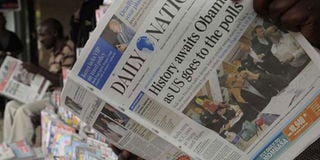The air should be cleared of media and investor lies

'Daily Nation' newspaper. The task of the sub-editors of the print media is to strengthen clarity of meaning in stories written by reporters and feature writers. FILE PHOTO | SIMON MAINA | AFP
What you need to know:
Gains of the cheating firms over the more honest ones are wholly unethical and criminal and should be mightily condemned by society as a whole, and by the UN.
Yet, indeed, in the news pages of our newspapers, cheating might, in the long run, prove terribly unrewarding. In the end, it might prove fatally costly.
For all cheating news companies work against the human society’s most objective and noblest information ideals.
What does one do whenever one clears the air in any situation? When the Nation used those words in its page one “splash” headline on September 17, it implied that, till then, the “news air” had been polluted and that one had needed to remove some mental debris from there to “clear the air”.
INVENT STORIES
The task of the sub-editors of the print media is to strengthen clarity of meaning in stories written by reporters and feature writers. Yet, despite the terribly polluted situation of East Africa’s English, especially in newspaper writing, practically every “private” commercial company also has a Public Relations (PR) department.
That interests me because I began my public career in the Kenyan branch of a British transnational firm called Gailey and Roberts. It appears that each Kenyan ministry now has a PR department. But it does not enthuse me because, for me, it raises a question. To what avail are “public relations”?
If a government department belonged to me, I might constrain all members of its public relations section to clear every “channel of the air” to enable the public to participate fully in and contribute essentially to my company’s policy- health making and commercial ability.
It might also require all information coming from us to enjoy the most solid basis and, in sheen, to dwarf the Milky Way. The only problem would be that many other such local companies might enjoy an advantage over us. If we are all newspapers, they might habitually invent and print exciting but totally false stories posed as “news”.
CHEATING READERS
Quite surely, inventing news is something newspapers do the world over. But I try hard never to sell myths. Euro-North American newspapers habitually invent negative stories, especially concerning Africa.
No, that is no mere hypothesis. In my career, I came across it about a million times in Kenya, Tanzania and Uganda. It usually begins by habitually cheating the readers.
If you are sharp, many media advertisements will remind you of the dishonesty of certain importers, manufacturers, shopkeepers and news-gathering companies. The point is that the gains of the cheating firms over the more honest ones are wholly unethical and criminal and should be mightily condemned by society as a whole, and by the UN.
Yet, indeed, in the news pages of our newspapers, cheating might, in the long run, prove terribly unrewarding. In the end, it might prove fatally costly. For all cheating news companies work against the human society’s most objective and noblest information ideals.
CRIMINAL PAPER
Yet a time might soon arrive — and, as the Bible puts it, “now is” — when the habit of cheating with the headlines might become known to a decisive number of the country’s news consumers and information regulators. Indeed, the occasion may soon arrive when only honest business people may make any profit even from criminal newspaper folly like that.
For your activities may enrage so many consumers into organising boycotts of your products. What is urgently needed, then, is consumer education to refine the public’s taste, a facet of business of which many global information merchants do not seem even aware. Thus consumer education should be an essential part of the responsibilities of every government.
Each Third World government, especially African, should appoint a ministry concerned solely with business ethics, including consumer protection, insurance of consumer education and of everybody’s mental safety.
In short, in all African states in which unscrupulous Western manufacturers keep dumping extremely dangerous consumer goods, the laws must be tightened to protect Africa’s people from the terrible evils of certain alleged “investors”.
Philip Ochieng is a veteran journalist





